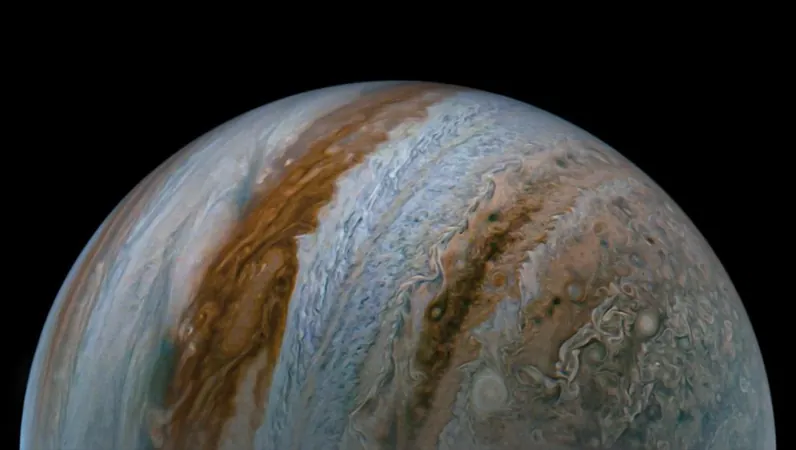
Unveiling Jupiter: The Planet Without a Surface That Could Devour 1,000 Earths!
2024-11-04
Author: Jessica Wong
What Makes Jupiter So Unique?
While the terrestrial planets like Earth, Mars, Venus, and Mercury boast solid surfaces, Jupiter is composed primarily of gas—mainly hydrogen and helium. Imagine a world where solid ground doesn’t exist and storms rage on that surpass even the fiercest hurricanes on Earth. Winds on Jupiter can reach up to 400 mph (640 km/h), creating a breathtaking yet dangerous environment.
Diving Deeper into Jupiter's Atmosphere
To grasp the conditions on Jupiter, consider the pressure changes in our own atmosphere. Descending through Earth’s atmosphere leads you to solid ground. Jupiter’s atmosphere, however, is vastly different. As you plunge deeper, the increasingly intense gas pressure resembles being at the bottom of a vast ocean—only, instead of water, you’re enveloped in gas!
At a depth of around 1,000 miles (1,600 kilometers), the abundant hydrogen gas doesn’t just linger in gaseous form; it transforms into a liquid state. Can you believe it? This is considered the largest ocean in the solar system—an ocean not of water, but of liquid hydrogen!
But the adventure doesn’t end there. As you delve further, you reach depths even greater than 20,000 miles (32,000 km), where the hydrogen behaves like a liquid metal. In this exotic state, electrons wander freely, creating a glowing and enchanted world beneath the gaseous surface.
What Lies at Jupiter's Core?
Eventually, you would reach Jupiter’s core, a region still shrouded in mystery. Scientists debate whether this core is solid or a hot, dense blend of metallic and liquid materials. Whatever the case, the staggering pressure here is akin to 100 million Earth atmospheres—a fearsome thought! And the heat? A blistering 35,000°F (20,000°C)—three times hotter than the Sun's surface.
Jupiter: Earth's Unsung Hero
Despite its hostile nature, Jupiter plays a crucial role in the solar system. With its colossal gravitational force, Jupiter acts as a cosmic shield, protecting Earth and other inner planets from potential asteroid and comet impacts. Without Jupiter’s immense mass altering orbits, Earth could have faced cataclysmic collisions over millions of years, perhaps preventing the rise of human civilization.
The Search for Life Beyond: Europa Awaits!
However, there’s more to the Jupiter story. Among its many moons, Europa stands out as a beacon of hope in the search for extraterrestrial life. Under its icy surface lies a vast ocean, and NASA's upcoming Europa Clipper mission, launching in October 2024, aims to explore this tantalizing world. Scheduled to arrive in April 2030, the probe will conduct around 50 flybys, unveiling the mysteries of the ocean that might harbor life.
As we continue to delve into the secrets of Jupiter, the largest planet in our solar system remains both a daunting and fascinating subject. Who knows what discoveries await us amid its gas clouds and hidden oceans? The possibilities are endless, sparking the imagination of scientists and curious minds alike!


 Brasil (PT)
Brasil (PT)
 Canada (EN)
Canada (EN)
 Chile (ES)
Chile (ES)
 España (ES)
España (ES)
 France (FR)
France (FR)
 Hong Kong (EN)
Hong Kong (EN)
 Italia (IT)
Italia (IT)
 日本 (JA)
日本 (JA)
 Magyarország (HU)
Magyarország (HU)
 Norge (NO)
Norge (NO)
 Polska (PL)
Polska (PL)
 Schweiz (DE)
Schweiz (DE)
 Singapore (EN)
Singapore (EN)
 Sverige (SV)
Sverige (SV)
 Suomi (FI)
Suomi (FI)
 Türkiye (TR)
Türkiye (TR)